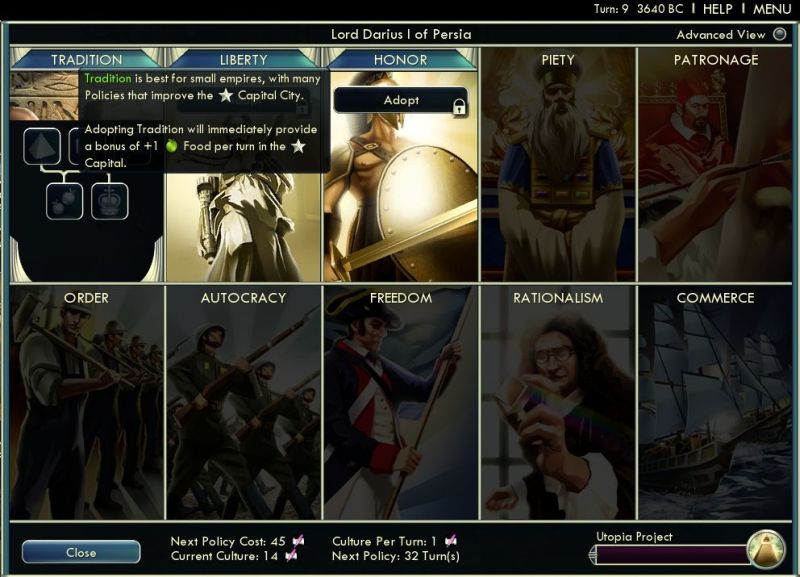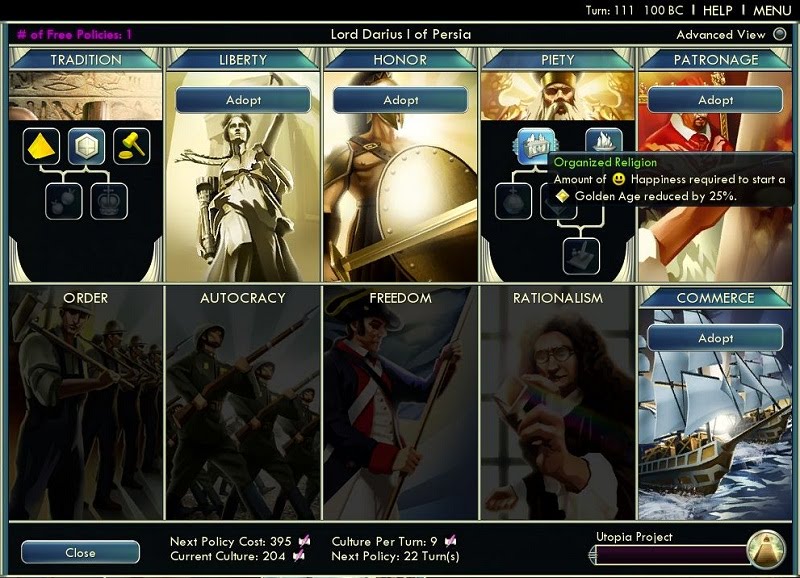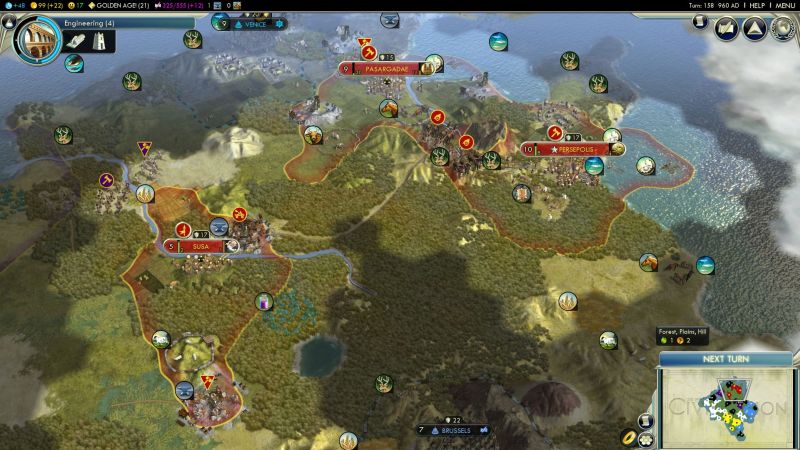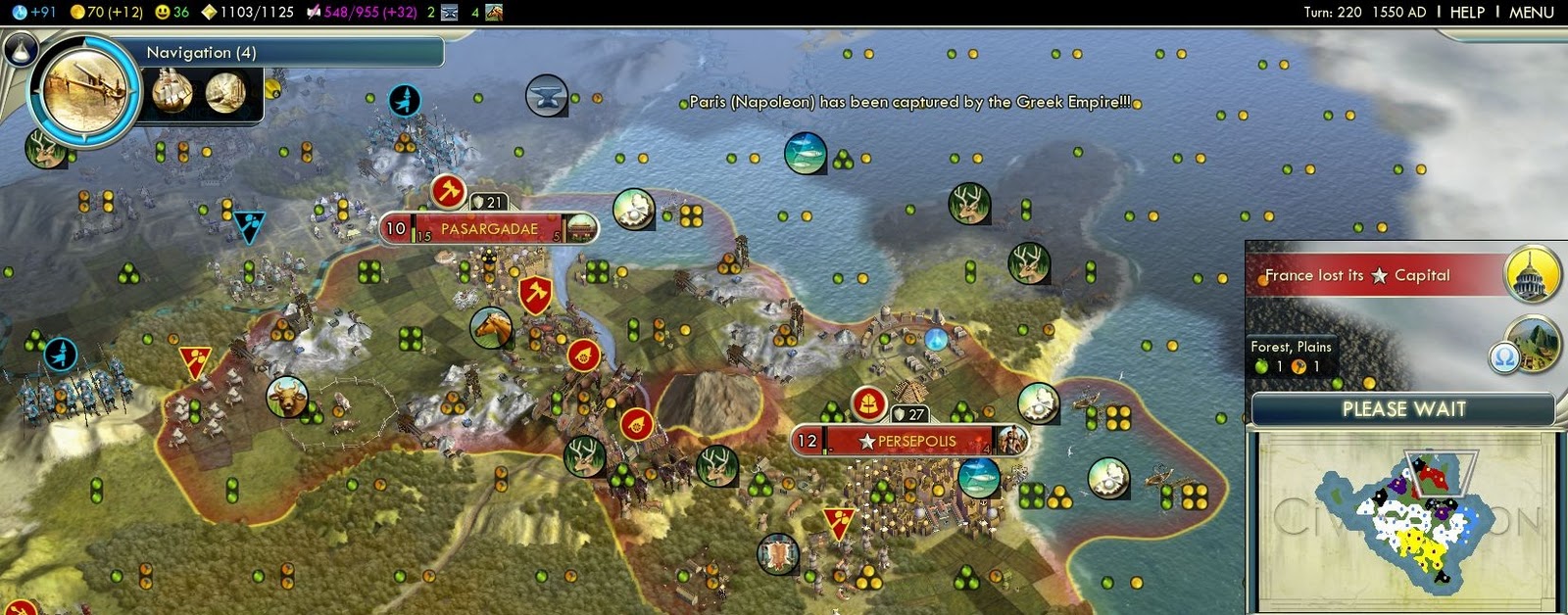So far I've won games of Civilization V up to Prince level. I now start pushing on to harder difficulties where the AI gets bonuses against you. On King level, I pick random for my leader, and I get ... Darius of Persia. All the civs get a different special ability, unit and building. Darius's ability is quite interesting: +50% Golden Age length. In a Golden Age your production and commerce are greatly improved. I already start formulating a plan to trigger Golden Ages as often as possible, possibly with an eye towards winning the space race. Golden Ages are triggered by accumulating large amounts of happiness over several turns. A small empire with several luxuries, happiness improving buildings and appropriate social policies is my strategy for earning this happiness.

In 4000 BC, I settle Persepolis. There are some nice resources nearby and my first choice is between researching for the land-based resources or the sea-based resources first. Decide to go for Animal Husbandry (towards Trapping) since each work boat is consumed when used, whilst an early worker can go on to other improvements.
I build a Scout and, along with my initial Warrior, they explore my starting landmass. With Civ 5, the world is quite well occupied from the start with 16 city states joining the 8 major civilizations. I meet up with a few nearby city states (Venice, a maritime city state, gives a food bonus to its ally, and Brussels, a cultured city state, gives out culture to its ally). I also meet my nearest neighbour, Augustus Caesar of Rome.
I get an early boost to my culture as a random reward from my Warrior exploring some ruins. Culture is spent on social policies - 10 separate "culture trees" that grant various bonuses, and I immediately have enough to implement my first policy. Since I'm still in the Ancient Age, I'm restricted to only 3 options - Tradition (good for your capital), Liberty (good for an expanding empire) and Honor (good for military). Since I'm going to stick to a smaller empire, I pick Tradition to get a small bonus to growth in my capital.

A barbarian encampment on a hill has spawned near Persepolis, so I bring back my Warrior and rush-buy another Warrior to deal with it. It's started spawning Brutes to attack me, and although cities are quite capable of defending themselves, I don't want to lose my Worker to the barbarians at this early stage. When the barbarians are swiftly dealt with, I have a Worker and the Trapping tech to improve the deer and fur tiles.
My scout continues to explore, meeting Napoleon of France, Ramesses II of Egypt and Alexander of Greece, along with a number of city states. I also get enough culture for another social policy - I can either pick another policy or make choices in the Tradition tree; I take Aristocracy in the Tradition tree, giving my capital a bonus to wonder production so I can shoot for some early wonders.
I research Sailing and produce a couple of Work Boats to work the fish and pearls. With the pearls and furs, I'm getting a nice boost to my happiness and a push towards a Golden Age.
I also produce my first Settler and, in 2400 BC, establish the city of Pasargadae to the north-west. The nice cattle tile is just outside of my initial borders, but I can spend some gold to expand my borders there. Happiness has immediately dropped from building a new city. Since number of cities and population both contribute to unhappiness, I'm going to be careful about how much I expand.

Writing is discovered and so I start Persepolis building it's first wonder, the Great Library which will give my a free tech if I complete it. I get a pop-up with all the civs listed in order of their technological progress. I'm last. :( I start signing Pacts of Cooperation with my neighbours, and when I get the money, Research Agreements. These are the primary way of turning cash into tech, approximately 250g each will get you a random tech (that you can research) in 25 turns time. Since you can't trade techs anymore, this is the way for co-operative civs to catch up in the tech race, and I plan to do it as much as my funds allow.

Persepolis completes the Great Library, and I enter the Medieval Age in 1640 BC with the free tech of Civil Service. It allows me to build a very useful Wonder for my strategy: Chichen Itza, which increases my Golden Age length by a further 50%. Unfortunately it requires a lot of production to finish, so I'll wait for my first Golden Age before I begin building it. Meanwhile I start building libraries to improve my research. I also start back-filling the tech tree since the Research Agreement techs are random, and I'd rather randomly be given an expensive tech than one that's quick for me to research.
I clear out a barbarian encampment and rescue a Worker for my neighbouring city state of Venice, for which they reward me with an alliance - bonus food for the next 20 turns (at which time my influence with them will have decayed back down to friendship).
With my next social policy, I choose Legalism in the Tradition tree for less unhappiness in my capital, effectively resulting in more happiness and brining me closer to a Golden Age.
In 1280 BC, I reach a cumulative 500 happiness and my first Golden Age triggers (lasting 15 turns). I start Persepolis on building Chichen Itza. It completes not long after the Golden Age ends and I start Pasargadae on the Oracle for the free social policy it provides.
Another pop-up with the technological progress of all the civs, and my research dedication and Golden Age has paid off as I'm at the top of the list. I've also just discovered Iron Working revealing plentiful iron to my south-west and a good spot for my third city. In 250 BC, I settle Susa in range of two iron, a dye, a wheat and a sheep.
Meanwhile, I've started working on the Piety social policy tree which is
the tree for improving happiness. When the Oracle completes in Pasargadae, I choose Organized Religion as my free social policy.

I'm focusing on research and infrastructure when Alexander calls me up to insult me. I realize my army is looking a bit thin and resolve to beef it up somewhat. With my horse resource, I can train 2 horse units, so I train some Horse Archers, an early ranged unit with nice mobility.
Although the civs have had many minor skirmishes with the city states (with Almaty conquered by Egypt), the first real war breaks out in 480 AD with Napoleon attacking Ramasses and Alexander coming to Ramasses's aid. I stay clear of the war, teching to Banking and entering the Renaissance Era first in 900 AD.
I've also built two national wonders in Persepolis - these are wonders that require all of your cities to have a specific building (another bonus for smaller empires). Persepolis has the National College (requires libraries, boosts research) and the National Epic (requires monuments, boosts great person production). With the boost from these, a great scientist is born in Persepolis. I can use him for a Golden Age, a free tech, or a research improvement on one of my tiles, which I think is probably the best long-term investment (since the great person Golden Ages have diminishing returns).
The next turn, in 940 AD, I enter my second Golden Age (this time lasting 22 turns!) I'm happy that my strategy seems to be working out so far and I resolve to push on building infrastructure during the Golden Age.

Next session, I'll see how long my peaceful ways can last and how long I can spend in Golden Ages.
Continued in Part 2





























